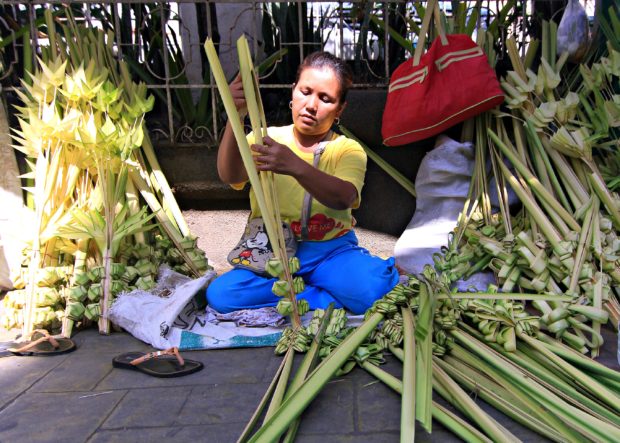
NOT THIS YEAR Palm weavers from Tayabas City show the art of weaving palm fronds, which are sought after on Palm Sunday. But the demand dried out this year as Masses and Holy Week-related Church activities remain suspended under the Luzon lockdown due to the coronavirus pandemic. —DELFIN T. MALLARI JR.
SAN PEDRO CITY—At this time of the year, most of the residents in the towns of Cavinti in Laguna province and Tayabas in Quezon province would have been busy preparing thousands of palaspas, or palm fronds to sell in the days leading to Palm Sunday in their respective provinces and in Metro Manila.
But there is no market for palaspas in this year’s Palm Sunday, the final Sunday of Lent and the beginning of Holy Week, commemorating the triumphant arrival of Jesus Christ in Jerusalem, after all Church activities are canceled due to the new coronavirus disease (COVID-19) pandemic.
In Cavinti, the coconut palms or olive leaves were left uncut, ribbons and ornaments tucked away for next year, and the townsfolk that used to rush last-minute orders were now confined in their own homes.
The weaving of palaspas, a symbol of the Palm Sunday celebration, is both a family tradition and additional income source in Cavinti.
Others, specially the elders, regard it as a religious vow.
“Perhaps about 70 percent of the town is into palaspas-making,” said Cavinti Tourism Officer Nitzshell dela Torre on Friday.
“It’s not like, say, just the [low-income households] but even those who own bigger houses and cars, they’re into it, too,” she said.
Lost income
The Catholic Church has called off the Palm Sunday’s traditional blessing of the palaspas amid community quarantines to keep the pandemic at bay. Instead, it has asked people to prepare whatever available branch or twig at home for the “blessing” through Masses aired on radio or streamed in the internet.
Cavinti Vice Mayor Arrantlee Arroyo said this meant lost income for the townsfolk, including his family that also produced palaspas.
“Our pwesto in [a church in] Caloocan, we inherited that from my grandparents,” said Arroyo, whose family sold around 4,000 fronds and earned at least P30,000 each year.
While residents commonly have other income sources, they look forward to Palm Sunday, which provides an average household an extra P10,000 for less than a week’s worth of labor.
Local officials, however, said they would rather comply with health safety protocols but lamented the people’s present situation.
‘Arimuhan’
“We have a term for that: arimuhan, that feeling of deep regret for something you hold dear,” Dela Torre said.
To cushion the impact of the lockdown and work disruption, the local government has distributed food aid to its residents, Arroyo said.
In Quezon, some priests will just go around their parishes to bless the palaspas in front of the houses of their parishioners on Palm Sunday.
Luz Sumague, 60, a native of Barangay Lakawan in Tayabas, said COVID-19 is a big blow not only among palm frond weavers in her town but also to Catholic faithfuls.
Tayabas is one of the oldest municipalities in Quezon province. Its Church, the Minor Basilica of St. Michael the Archangel, was declared a National Cultural Treasure in 2001 by the National Museum.
“I will still weave some palm fronds but maybe for just my family and friends,” she said.